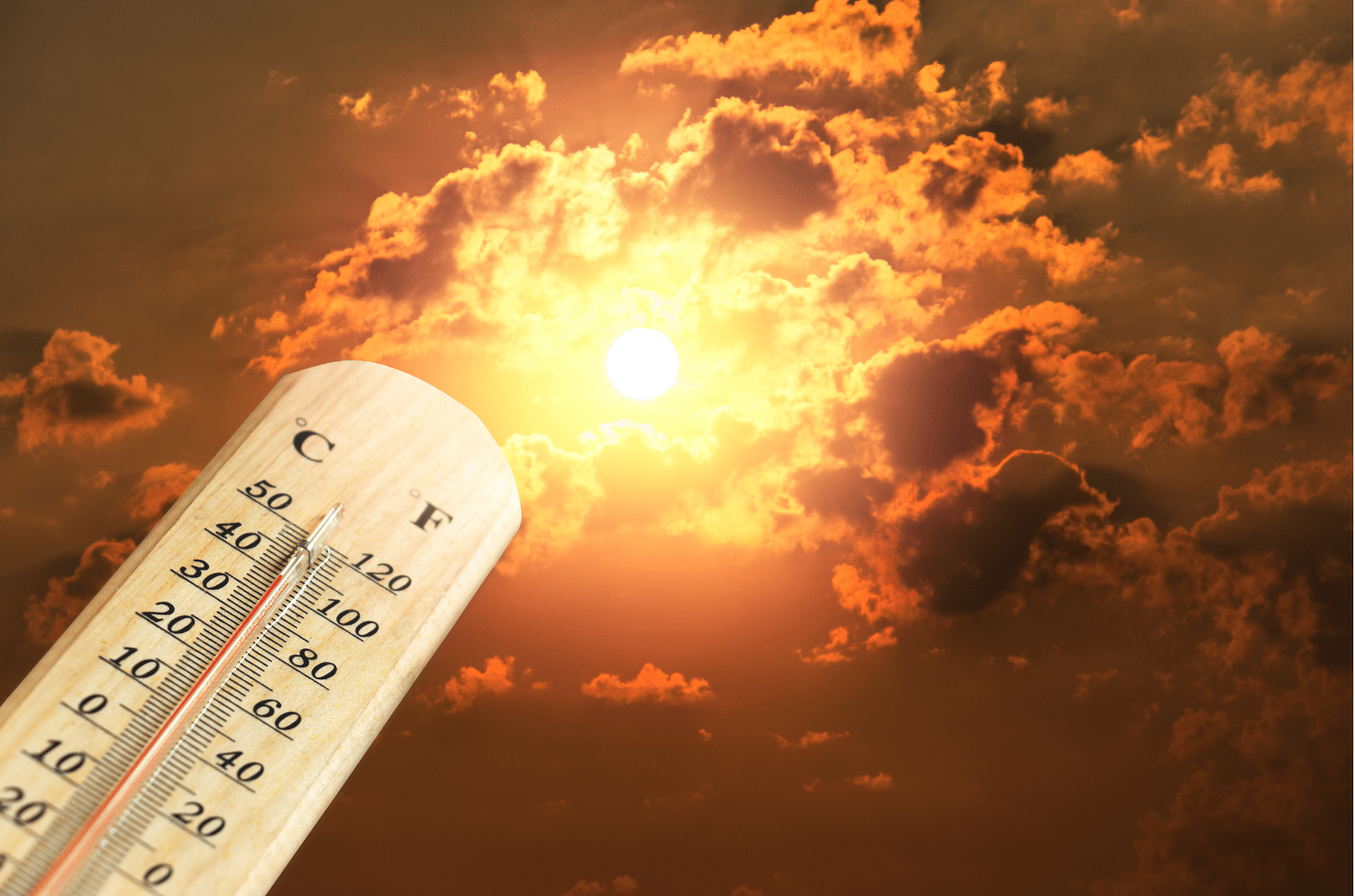Unlike Sly and The Family Stone’s Hot Fun In The Summertime, a heat wave is no fun. The extreme heat of this summer can take all the fun out of the season if we’re not careful. Let’s chat about staying safe in this summer’s heat.
But first, some background. I grew up in a small ranch-style house in northern New Jersey without air conditioning. On hot summer nights, my brother, sister, and I would sleep – or try to – on folding lounge chairs on the back patio; sometimes our friends from next door would join us in a make-shift pajama party. The huge oak tree next to the patio made us feel like we were under a leafy cathedral ceiling. We used pieces of cardboard to fan ourselves while trying to find the Big Dipper and the North Star until we finally dozed.
My folks had a box fan in one of their bedroom windows, and dad had it set to pull the hot air out of the room. To keep their room as cool as possible, their door was kept shut and the curtains were pulled. Drapes were drawn in rest of the house too, and the windows kept shut to keep out the heat and hot air. Hot summer days in the house were dark, close, and still; hot summer nights were dark and still as well and the quiet was disturbed only by the drone of mosquitos and rhythmic call of katydids.
My 87-year-old mother has lived her entire life in homes without air conditioning, and actually has trouble adjusting to air conditioned environments. But, with the extreme heat the entire country is experiencing this summer, she’s here with me in my air conditioned Kentucky home.
Despite the access to AC, this unprecedented heat wave presents other challenges to keeping our cool and enjoying the summer. What do we watch out for, how do we keep safe, and how can we still have hot fun in the summertime?
What to watch out for
Health risks associated with heat exposure can range from milder conditions such as heat cramps to heat strokes, which can be fatal. Let’s get familiar with the symptoms of heat-related illnesses to head off potential problems.
- Mild dehydration and heat cramps — muscle pain or spasms — may be early signs that your body is not reacting well to the environment, said Matthew Levy, an associate professor of emergency medicine at Johns Hopkins University School of Medicine.
- Heat exhaustion symptoms are more worrisome. These can include heavy sweating, elevated heart rate, nausea and vomiting, headaches, dizziness, fatigue and generally feeling unwell. Some people who are experiencing heat exhaustion might also faint. “This is where things are getting dangerous fast,” Levy said.
- If heat exhaustion is left untreated, it may progress to heat stroke, which means the body’s core temperature has reached the point where cellular damage may start to occur.
- The key feature of heat stroke is central nervous system dysfunction – confusion and possible seizures.
- Another sign is lack of sweat. A dry person who’s not thinking clearly is at big risk and should seek help ASAP.
How to stay safe
- Keep cool and hydrated.
- Stay in spaces with air conditioning. If you only have a fan, experts recommend misting yourself with a spray bottle of cold water.
- Spend time at indoor public places such as malls or libraries.
- Go to a park, which can be five to 10 degrees cooler than indoor space.
- When outdoors, dress in loose, lightweight, light-colored clothing and protect yourself from the sun with hats, sunglasses and sunscreen.
- Drink plenty of water, but don’t guzzle it; drinking too much water could cause a potentially fatal condition known as hyponatremia.
- Don’t drink excessive amounts of alcohol or caffeine, both of which can be dehydrating. A good way to know whether you’re adequately hydrated is to pay attention to the color of your urine. Dark yellow is not good; very pale yellow or clear is ideal.
- Limit outdoor exercise to less intense workouts, and do them early in the morning or in the evenings.
Who is at increased risk?
Although anyone can be negatively affected by hotter temperatures if they’re not careful, certain populations are more vulnerable, including the elderly, young children, athletes, people who have chronic medical conditions, pregnant people and those who may be struggling with mental health issues.
If you know anyone who might be at increased risk, check in on them during heat waves and make sure they’re equipped to stay safe.
- Invite an elderly relative to stay with you (like me and my mom!).
- Help someone get to a community cooling center.
- Stop by people’s homes to make sure their air conditioners are working or to bring them cold drinks.
- NEVER leave young children or pets in cars on hot days, even if the windows are open.
- Pets are at risk, too! Click here for tips on keeping your pet safe in the summer.
What to do if you or someone else is sick from the heat
- Get into a cooler environment — preferably some place with air conditioning — as quickly as possible.
- Lower the body’s core temperature by removing clothing and wetting skin with cold water.
- Hydrate with cold fluids, such as water or electrolyte drinks.
- For more severe problems like heat stroke, seek medical help immediately.
- While waiting for assistance to arrive, it’s critical to take action. Get the person out of the heat and either into air conditioning or shade. The fastest way to cool someone down in an urgent situation is cold-water immersion — the colder, the better. If that’s not possible, pour cold water on the person’s head and clothing.
Ideas to have fun despite the heat
- Go to a pool in your community if available. Bring water in non-glass containers.
- Visit your neighborhood library or indoor shopping mall
- Go the movies
- Visit a local museum
- Stay inside and read a good book
- Eat ice cream
- Go bowling
- Try an escape room
Above all, remember that cool fun in the autumn-time will be here before you know it.
How about another shameless plug for our hard-working team of Fath Properties service professionals who are always there to keep your place cool so you can Love The Place You Live?
Resources: Washington Post, CDC

